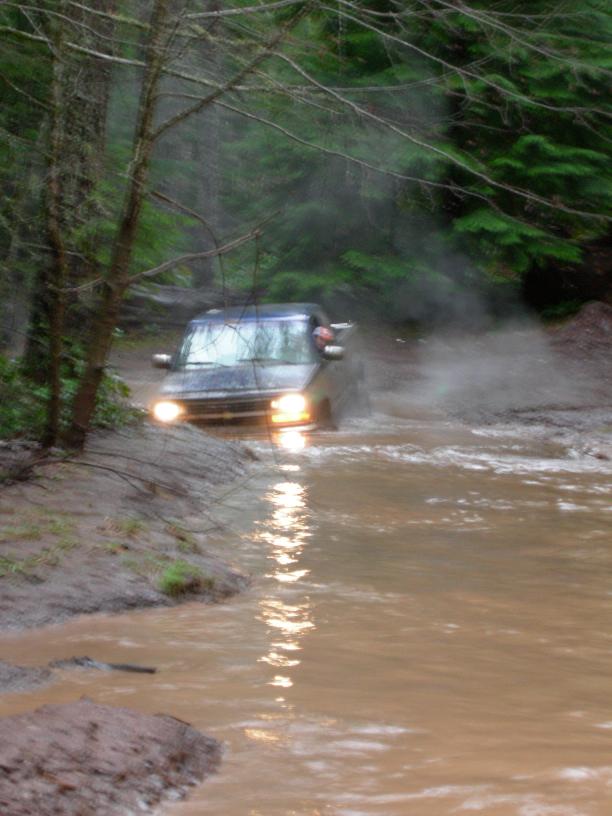Bark saves 335 acres of forest from No Whisky Timber Sale!
Negotiations also led to a plan to decrease off-road vehicle abuse in the Clackamas River watershed

No Whisky is about more than just the trees: Bark stopped the Forest Service from increasing illegal off-road activity. Photo: No Whisky Timber Sale, January 2006.
When Bark first caught wind of No Whisky the Forest Service was planning to log 50-120 year old forests: some plantations grown up from previous clearcuts and some rare native forest. Ultimately, No Whisky included 39 individual units and 1,978 total acres of logging. After already witnessing a decade of industrial logging in the North Fork watershed Barkers immediately sprang to action when No Whiskey was announced.
Bark led three field trips to proposed No Whisky units in 2000. Groundtruthers focused first on the older forests proposed for logging and documented the key ecologic characteristics that were going to be destroyed such as snags for woodpeckers and downed logs for rare species of mollusks that need shade and moisture. Bark sent dozens of letters to the Forest Service telling them what we found and why we wanted them not to log. Before the Forest Service even sent their scoping letter (the official notice of proposal) they had dropped 335 acres from the proposal, including all of the native forests!
On November 8, 2005, the official proposal was out: 1,720 acres of logging to “maintain health,” and “enhance and restore diversity.” Bark’s success in getting the native forests dropped from No Whisky meant that we hadn’t yet groundtruthed the younger forests proposed for logging. Bark had only been to four of the now 31 units. The clock was ticking and we new we only had a matter of weeks to cover almost three square miles of forest and get comments into the Forest Service. Why so fast? During the scoping period, the agency is still collecting information to include in its Environmental Assessment and hasn’t yet become wedded to specific outcome. So public input at scoping is critical. There was only one problem…snow!
Last winter the snow came early and fell hard. Eventually we reached all but three units, but the Forest Service’s timeline (from the scoping announcement to the end of the comment period was only five months) made it very difficult. But by the March deadline Bark Groundtruthers covered over three square miles of forest, and found numerous problems with the markings of the timber sale. One of the lead Groundtruthers, Charlie Ferranti, puts it bluntly, “The Forest Service said they were providing 50-foot ‘no-cut’ buffers for streams, but when we went to the forest we found buffers as small as 10 feet. What would have happened if no one was watching?”
While Bark Groundtruthers weathered rain and snow in the forest, Bark canvassers and volunteers were pounding the pavement in the city to let Oregonians know about the threats posed by logging No Whisky. All in all, over 800 concerned citizens wrote to the Forest Service asking for them to protect the North Fork of the Clackamas River, stop the illegal off-road vehicles, and to not make the problem worse with the No Whisky Timber Sale.
No Whisky is a different type of timber sale for the Forest Service however, because it is a relatively young (~50 year-old) plantation, not old growth. While Bark is still in court protecting Mt. Hood's old-growth forests from the Solo and Borg Timber Sales, just to name a few, we still have concerns about logging young forests. The tractors used to log the forest compact the soil, increasing surface runoff and harming micro-roots and mycorrihzae, or the roots of mushrooms that help transfer nutrients to trees. Logging on steep slopes (some over 30%!) decreases stability and can cause landslides, even if the trees are small. And the biggest threat of all…the No Whisky Timber Sale area is a destination for illegal off-road vehicle abuse. Thinning the forest in half would open miles and miles of new routes to this abuse, which is destroying the water quality of the North Fork (see photo).
Ultimately, with the backing of over 5,000 members, 800 letters from Oregonians, and field data from dozens of Groundtruthers, Bark was able to negotiate with the Forest Service and:
-Saved 335 acres of forest from being logged, including all of the native mature forest;
-Increased “no-cut” stream buffers to protect water quality;
-Stopped the Forest Service from facilitating more off-road vehicle abuse; and
-Brokered a deal to ensure that money from logging will be used to restore areas destroyed by off-roaders.
For more information on the No Whisky Timber Sale click the link below.
More about No Whisky...




